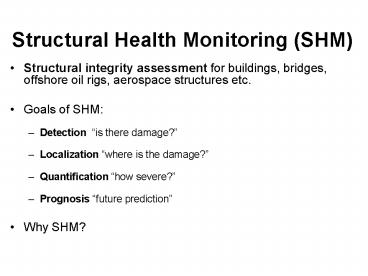Structural Health Monitoring (SHM)
1 / 10
Title: Structural Health Monitoring (SHM)
1
Structural Health Monitoring (SHM)
- Structural integrity assessment for buildings,
bridges, offshore oil rigs, aerospace structures
etc. - Goals of SHM
- Detection is there damage?
- Localization where is the damage?
- Quantification how severe?
- Prognosis future prediction
- Why SHM?
2
Sensor Networks for SHM
- Current SHM
- Bi-annual visual inspections (most common)
- Limitations of human accessibility and error
- Catastrophic failure between inspections
- Expensive wired data acquisition systems
- Extremely high installation, cabling, and
maintenance cost - Wireless Sensor Network based SHM system
- Flexible, fast and low cost deployments
- No cabling cost
3
Vibration based SHM
- Measure and analyze structural vibrations induced
due to heavy winds or earthquakes, etc - Principles behind structural algorithms can be
illustrated by strings - Structural response is composed of several
harmonics - modes - Mode lt Frequency, Mode Shapegt
- Damages alter the structural properties and hence
the modes - Structural response is measured by using sensors
(accelerometers, strain gauges) at several
locations in the structure
4
Existing SHM Techniques
Damage Detection Damage Localization
Time Series Modal Frequency Mode Shape Neural Networks Time Domain Frequency Domain
Changes in structure coefficients Changes in modal frequencies Changes in mode shape Train neural networks with data Reconstruct a structural model from data Reconstruct structural model using mode shapes
5
Requirements for SHM Applications
- Reliable Delivery
- SHM applications are loss-intolerant, sensors
need to transmit data reliably - Time Synchronization
- Data from various sensors should be
time-synchronized to within 100 micro-sec for
damage localization. - High Data Rates
- A hundred tri-axial sensors sampling at 500Hz can
generate a data rate of 5Mbps. - Dense Sensing
- The larger the number of sensors the better the
performance
6
Deployment
- Building Details
- 48 inches high, 4 floors, 60 lbs
- Floors 1/2 x 12 x 18 aluminum plates
- steel 1/2 x 1/8 inch steel columns
- 5.5 lb/inch spring braces
- 4 actuators on the top floor
- 8 motes, 2/floor
- 4 Test Cases
- braces from floor 4 removed
- braces from floor 3 removed
- braces from floor 2 removed
- braces from floor 2 and 4 removed
Jeongyeup Paek, University of Southern California
7
Damage Detection and Localizationon scaled model
Jeongyeup Paek, University of Southern California
8
New Developments in SHM Systems
Remote Command Control and Display
Real-Time Alerting
Health Monitoring
High-Speed Event Recording
Time
On-Line
Off-Line
Multitasking
Processing
Resolution
Satellite
IP
Telephone
RadioCellular
80
90
70
Dynamic Range of Data Logger
Structure
Control CenterGateway
Communications
Kinemetrics Inc.
9
Wireless Bridge Instrumentation
Users
Internet
Wireless Intranet
Control Center Gateway
Kinemetrics Inc.
10
Typical Sensors Used in Bridges
- Accelerometers
- Strain gauges
- Wind speed and direction
- Temperature transducer
- Displacement transducer
- Deflection/Tiltmeter
- High precision differential GPS
- Others
- Audio Video






























